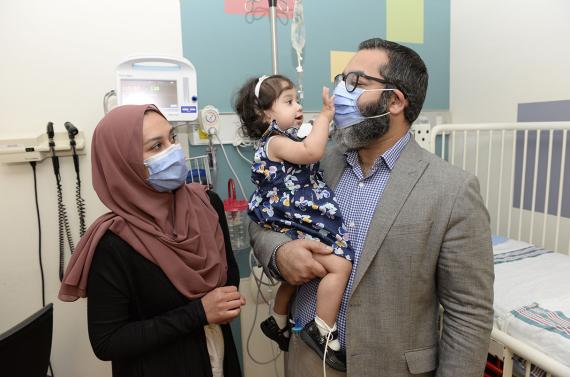An article in Science tells the story of the work published on November 9 in the New England Journal of Medicine in which a toddler who, before birth, received successful in utero treatment for Pompe’s disease, a rare genetic disorder. Babies with infantile-onset Pompe’s disease often die by two years of age, a fact well known by the parents of the patient in this story, who lost two other children from the same disease early in life.
Professor Michael Gelb and his research group at the University of Washington contributed to this success story by analyzing samples of the patient’s fetal plasma over the course of treatment.
Gelb, who is also the Boris and Barbara L. Weinstein Endowed Chair in Chemistry, has long worked to develop assays to detect lysosomal storage diseases and other rare treatable genetic diseases in newborn screening. In this case, the diagnosis of infantile-onset Pompe’s disease came before birth, and the patient received in utero enzyme-replacement therapy as part of a clinical trial.
Enzyme-replacement therapy is to inject the enzyme that is deficient in the patient into their bloodstream where it can migrate to the cells that need it. The in utero treatment was an extension of what is normally done in enzyme-replacement therapy where the deficient enzyme is injected into the blood of the baby. But in babies whose bodies do not make any amount of the enzyme, the baby’s immune system reads the enzyme drug as foreign, and the baby starts to make antibodies to the enzyme which blocks its action.
“The key here is that if you inject the enzyme into the fetus, the fetus only barely recognizes it as foreign and the antibody response is much less,” Gelb explained by email.
The second point is that the loss of enzyme leads to damage—already happening to the fetus. By the time the baby is born, irreversible organ damage has already occurred. The earlier the enzyme is given, the better the patient does, having avoided some amount of irreparable damage.
This in utero treatment was the first of its kind and saved the patient, Ayla Bashir, from her siblings’ fate. At her birth, Ayla showed no signs of heart problems, and is now a seemingly healthy toddler with normal cardiac function who is meeting developmental milestones. She continues to receive enzyme-replacement therapy.
Congratulations to Prof. Gelb and co-workers for their life-saving work and for the exciting press in Science, The New York Times , Time, the CBC, and many other news outlets around the world!
